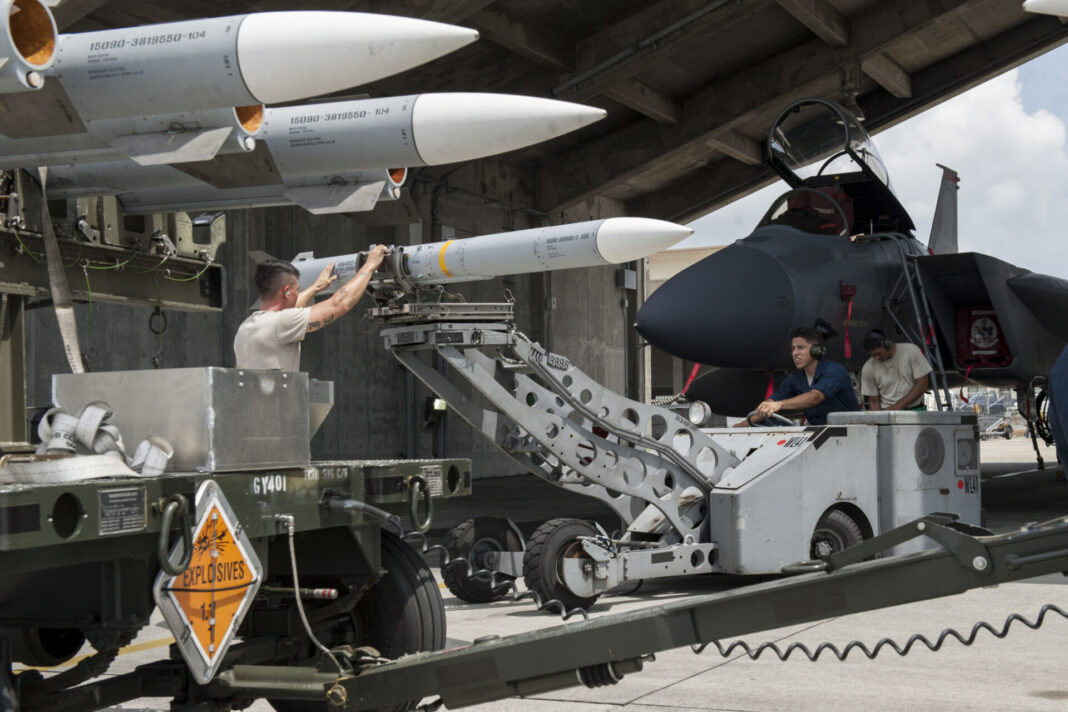Brett McGurk, the US National Security Council’s coordinator for the Middle East and North Africa, told The Gulf States Institute in Washington the President Joe Biden’s administration is committed to helping Riyadh defend its territory.
He noted there are “many issues in the bilateral relationship with Saudi Arabia, but we are fundamentally committed to the territorial defence of Saudi Arabia, no questions asked”.
“Helping our partners defend themselves is an axiomatic principle across the region,” McGurk stated, pointing to the recent vote in the Senate that prevented a block on an arms sale to Riyadh.
“The Saudis need [these weapons] because the Houthis, with Iranian backing, are launching dozens of drones and missiles from Yemen into Saudi Arabia,” he stressed.
The Saudis are currently defeating “nine of 10 of these threats”, he claimed, adding, “Of course, we want to get that up to 10 of 10.”
The US State Department has recently approved its first major arms sale to Riyadh under Biden with the sale of air-to-air missiles valued at $650 million, according to the Pentagon.
Saudi Arabia and its allies launched a war against the Arab world’s most impoverished nation in March 2015. The war has been seeking to restore power in Yemen to Riyadh’s favorite officials.
The death toll of the war, now in its seventh year, will reach an estimated 377,000 by the end of 2021, according to a recent report from the UN’s Development Programme.
The fighting has seen some 80 percent of the population, or 24 million people, relying on aid and assistance, including 14.3 million who are in acute need.
As to Syria, McGurk said the US has no intention of withdrawing its small number of troops in the country.
“We are not there for oil, we are not there for regime change,” he stated, explaining that the mission is focused on countering terrorism.
Asked about the US position on Syrian President Bashar Al Assad, McGurk noted the US has accepted the current reality that he is staying in power.
“I think we have to recognise the reality of the staying power of Al Assad and that does not mean, however, we would engage with him,” he added.
The US official announced the Biden administration is looking to prevent the creation of failed states and power vacuums in the region.
He pointed to mistakes in the past 20 years made “not just by the United States, but by other actors in the region, in which the hope was that vacuums might be filled by moderate actors, and in fact, we see vacuums filled by Iranian back networks and extremists of Daesh”.
Syria has been gripped by foreign-backed militancy since March 2011. However, Syrian government forces, backed by Iran and Russia, have managed to win back control of almost all regions from terrorists. The US and its allies invaded Syria in 2014 under the pretext of fighting the Daesh terror group. Washington has long been training militants, collaborating with anti-Damascus militants, and stealing Syria’s oil, ignoring repeated calls by Damascus to end its occupation of the country.
McGurk has also claimed advances in Iran’s nuclear programme are reaching a “crisis point” as negotiators return to Vienna to continue nuclear deal talks. He saw the Vienna talks as more urgent than ever.
The Iranian nuclear programme is “advancing so rapidly that it is approaching a crisis point, [by] the first part of next year, and I think that is lending some urgency to the negotiations”, McGurk said.
He stated the goal of President Biden’s administration is reining in Iran’s nuclear programme in a way that satisfies US, international and regional interests.
“The only way that Iran can come out of the sanctions is through returning — getting its nuclear programme back in a box,” McGurk added.
Last month, McGurk told the Manama Dialogue conference that if diplomacy fails with Iran, the US is “prepared to use other options”.
He drew a distinction between military action aimed at regime change in Iran and at halting its nuclear progress.
“When it came to military force for behaviour change, that is a pretty fuzzy objective for a military force. When it comes to military force to prevent a country from obtaining a nuclear weapon, that is a very achievable objective,” he noted.
Tehran denies seeking nuclear weapons, stressing it wants to master nuclear technology for peaceful purposes. Iranian officials have also stressed the country reserves the right to respond to any adventurism by the United States and Israel.
At the same time, McGurk welcomed dialogue with Iran as well as between major regional players, pointing to how the UAE had reached out to both Turkey and Iran and to Saudi Crown Prince Mohammed bin Salman’s recent visit to Qatar.
“That’s something, by the way, that we very much encourage. We do think, at this time in the world, coming out of the pandemic, coming out of all these crises, it is time to open dialogue across borders,” he stated.
